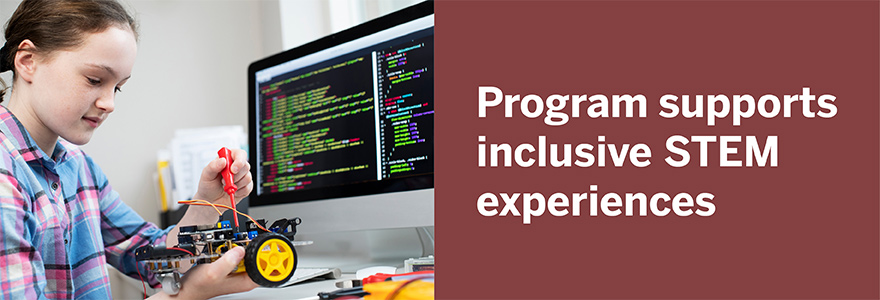
News and Events
Let’s Talk Education Speaker Series
- Online
- Thursday, March 4, 2021
- 7-8 p.m., ET
- Link to presentation
Program supports inclusive STEM experience

Two Faculty of Education researchers are removing barriers for students with developmental disabilities in science, technology, engineering and mathematics (STEM) education.
Applied Behavior Analysis Professor, Nicole Neil and STEM Education professor, Anton Puvirajah have created the STEM and Social Skills (S3) program to support students with autism spectrum disorder (ASD).
The goal is to develop students’ STEM abilities and social skills.
The program develops students’ STEM knowledge through engaging and ability appropriate activities in coding, structural engineering, fluid dynamics, and electrical circuits, said Puvirajah.
In addition, students develop social skills that are relevant for STEM, such as asking questions and responding to feedback through video-modeling. This method is used in combination with other applied behaviour analysis teaching strategies, such as prompting and reinforcement within the group, added Neil.
“We offered the S3 program through an informal learning context to ensure that participants had as much agency and ownership as possible during their involvement,” said Puvirajah.
As a result, the preliminary results have been impressive. The researchers found students showed a greater interest in STEM careers at the end of the program and there was an increase in positive attitudes towards STEM subject areas. Parents and students were also positive about the program’s format and content, said Neil.
The S3 program is important because students with developmental disabilities often receive inadequate or superficial STEM experiences because these programs do not leverage students’ strengths and abilities. Furthermore, these experiences may be too challenging or not challenging enough for them, said Puvirajah.
Students with developmental disabilities also have fewer opportunities than their typically developing peers to participate in STEM outside of school.
“They might experience physical or sensory barriers when attending community settings, like museums or camps that offer STEM programming,” said Neil. “They could also face social barriers as some families report they feel frustrated with how others react to their presence or it could also be that programming and material isn’t presented in an accessible way.”
Puvirajah added STEM programs need to create high quality, affordable, STEM programs where facilitators have the expertise and the ability to work and support students with developmental disabilities in achieving their learning goals instead of offering programs that just pass the time.
In fact, evidence suggests out of school and informal education experiences are important for developing young student’s knowledge of STEM and interest in STEM careers, said Neil.
“An afterschool STEM program is voluntary and there’s a lot of flexibility in how programming is offered. It’s also been used to encourage other underrepresented groups to engage in STEM, such as programs for women and girls, by providing both social and academic support,” she said.
The pilot study involved a small number students with ASD between the ages of 11-15. They’re hoping future research will involve a broader age range of students and additional diagnoses of developmental disabilities.
Going forward, researchers and the London Children’s Museum will work together to develop and evaluate inclusive STEM programming when pandemic restrictions are lifted.
Neil and Puvirajah will present their S3 program at the Let’s Talk Education Speaker Series in March.

